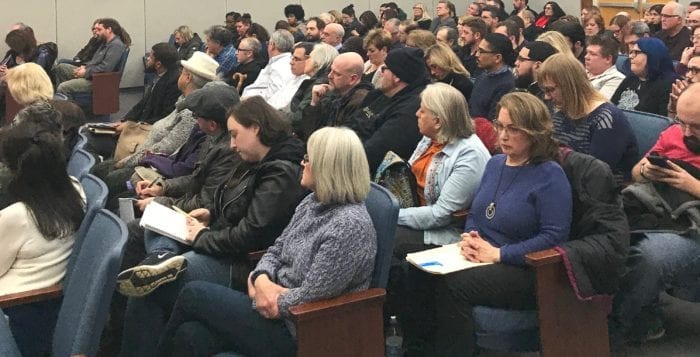Suffolk County asks the question: What to do about marijuana legalization?

By David Luces
When it comes to legalizing recreational marijuana, the debate continues in Suffolk County.
More than 100 people filled the Suffolk County Legislature chambers Feb. 25 for a public hearing on the legalization of recreational marijuana and its potential impact. The over two-hour meeting fueled a contentious debate between attendees, with supporters pointing to the tax revenue the county could gain from possible legalization and the health benefits attributed to marijuana. Opponents argued that it is a quality of life issue and their view of the plant as a gateway drug, supporting the idea of the county opting out.
“When it comes to the young developing brain there are no such things as safe drugs.”
— Kym Laube
County legislators on the health committee held the hearing to gather input from the community as New York State inches closer to legalization. Gov. Andrew Cuomo (D) expressed his support for legal recreational cannabis in his inaugural address in early January.
John Durso, president of Local 338, a union that represents close to 300 workers in the NYS medical cannabis industry, said he supports legalization and views it as a potential source of economic development in the county — if done right.
“As we got to know more patients, caregivers and medical professionals, we learned even more about the benefits of medical cannabis,” Durso said. “In easing symptoms for those who are ill or those who suffer from chronic pain, [it gives them] the ability to live more fulfilled lives.”
Durso added the legalization of cannabis is an opportunity to expand beyond the 5 percent of the New York population who are currently enrolled in the state program and allow more to benefit from its effects.
Kym Laube, executive director of the nonprofit social services organization Human Understanding and Growth Services, said instead of focusing on just one drug we as a county need to address all drug use for the sake of children.
“When it comes to the young developing brain there are no such things as safe drugs,” Laube said. “Schools across Long Island are fighting this — I just don’t think we are ready today to allow this to come [into the county].”
At first, her stance was a strong no for recreational marijuana, but now with legalization potentially on the horizon she hopes it can be delayed as long as possible.
“Let’s think of how we can build our drug prevention infrastructure,” she said. “Let’s ensure before we roll this out that every youth has access to prevention as much as they have access to drugs.”
Troy Smith, deputy director of the Empire State NORML, an advocacy group for the regulation and safe sale of marijuana, said he is not advocating for legalization, rather regulation to an existing industry and safe access to the plant.
“I would like to urge you all to just say ‘no’ — don’t opt out,” he said.
Smith said many law-abiding citizens partake in the consumption of marijuana, and legalization would lead to the existing business being regulated better so customers are protected. He also added by opting out the county would forfeit tax revenue and benefit drug dealers and criminals.
David Falkowski, owner of Open Minded Organics in Bridgehampton, which grows industrial hemp and sells CBD oil, echoed Smith’s sentiments of not opting out.
“I would like to urge you all to just say ‘no’ — don’t opt out.”
— Troy Smith
“If by chance the county feels like it needs to opt out, I just ask them that this decision is not left up to a small board of temporarily appointed representatives and that it goes to a referendum vote,” he said. His sentiments were followed by loud applause from pro-legalization supporters.
Some residents expressed concerns about quality of life and potential second-hand smoke hazards. If the county chose not to opt out, one resident asked representatives to outlaw and prohibit smoking in multiple unit-dwelling buildings to avoid the issue of people getting a contact high.
For Kimberly Miller of Deer Park, marijuana isn’t all about getting high — it is more personal.
As a recovering alcoholic and sexual assault survivor who suffers from depression, anxiety and PTSD, Miller said, for her and others like her, microdosing marijuana fills the gap traditional medicine doesn’t provide.
“Today I’m here asking you to fill one last gap for me,” she said. “Legalize and regulate marijuana, like you do with alcohol and tobacco. Let me buy it from a reputable business and let me pay taxes on it. Build some commerce. It’s a win-win for both of us.”






